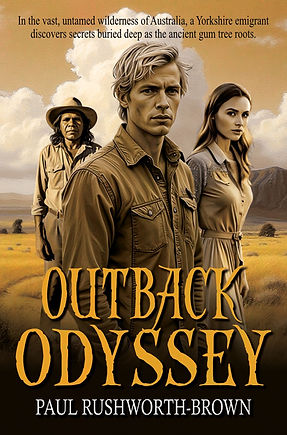EEN HISTORISCHE REIS VAN DRAAIEN EN AVONTUUR MET EEN SPECIFIEKE PASSIE.
Een verhaal over een boerengezin dat in 1642 werd getroffen door de verwoestingen van de Engelse burgeroorlog. Een jonge man, Tommy Rushworth, probeert in leven te blijven nadat hij is ondergedoken in het parlementaire leger en ten strijde is getrokken. Thomas Rushworth Snr racet tegen de klok om zijn zoon te redden van de dreigende dood in een oorlog waar hij geen deel van wilde uitmaken.
Terug in Haworth wanhoopt Tommy's moeder, wachtend op nieuws over het lot van haar zoon en echtgenoot. Door de onrust en het lijden ontwikkelen William en Lucy hun eigen liefdesverhaal en worden ze tot het uiterste op de proef gesteld door de vervolging van de rentmeester van het landhuis die samenzweert om hun toekomst te saboteren.
De bloedige hel van de oorlog en de saga van familiebeproevingen drijven dit historische drama met uitzonderlijke verhalende en feitelijke nauwkeurigheid van de getalenteerde auteur die SKULDUGGERY schreef en een van de gevestigde nieuwe auteurs van Australië wordt.
Red Winter Journey Paperback
CHAPTER ONE
Margery’s End
The story of the English War is one of political endeavours,
one of religious freedoms and, of course, the right of divine rule
ostracised by the strength of a growing democratic political system.
Some spoke of the power of government at this time and the fine
line between autocratic rule and people’s choice, but what about
the common people, those that lived day to day like the Rushworth
family and others like them. How might this brazen battle for
change have affected their lives? One cannot envisage these changes
without first coming to terms with the day-to-day lives of the people
and the hardships and adversity they already faced.
Thomas was exhausted from the sixteen-hour day; he collapsed
on the hard-backed wooden chair beside the hearth. He puffed on
his white clay, long-stemmed pipe and gazed silently into the flames.
The greyish puffs of exhaled smoke escaped from the corner of his
slightly parted lips. He blinked repetitively, trying to rid his eyes of
their dryness.
Thomas took the pipe from his mouth and grumbled, “What news
have ya’ heard in the village, William?”
“Apprentices in London, they’re striking and rioting in the streets.
Calling on Parliament for change.” William took a seat with him
relishing the safety and comfort of their hearth.
They all liked the feeling of the radiant warmth of the fire while
hearing the wind howl and blast the snow around outside.
There was a war coming, and Thomas Rushworth wanted no part
of it. It wasn't their war. They were in a battle each day, a battle to
put food in their stomachs. Yet, they were to be inexplicably drawn
into this drama through no choice of their own. This event would
affect the lives of the Rushworths forever.
The village of Haworth was situated on a hillside at the centre
of a large rural district near Bradford, green as green in spring and
summer, cold and desolate white and insignificantly blank most
other times. The land around the village was very hilly and bleak,
with the coldest of winds in all seasons except the hottest days in
summer. There were few trees, and the surrounds were a moorland
filled with fens, bogs and peat.
The village itself was essentially one long steep street lined with
stone cottages and daub and wattle cruck houses built in chaos
with no idea of order or care. The muddied main road drifted in a
northwest and southeast direction with a triangle at the top of the
hill. Inhabitants called it the square. The square housed the greatest
number of residents, primarily shopkeepers, spinners and weavers who wanted to stay away from Weavers Hill.
Those that didn’t live there lived as tenants, herdsmen and
copyholders to Lord Birkhead, herding sheep and farming small 7
to10 10-acre lots on his lands at Hall Green.
Most of the English wool was exported abroad to Flanders,
Bruges, Ghent and Ypres and the foreigners paid highly for it. At the
time, spinners, weavers and clothiers working it lived reasonably
well. Even the lowliest of poor men and hedge thieves could get
a hold of enough rough wool and make a small profit for a time.
Eventually, poor quality staples and high asking prices plunged the
market into despair. As time went by, looms became quieter and were
significantly affected by the growing political unrest. The fear of
coming hostilities caused the reduction of trade and the decreasing
popularity of English wool.
Thomas Rushworth and his family tried to earn what coin they
could from their spinning and weaving of any course wool they
could find. The seven acres of barley and a small vegetable garden
fraught with worm, beetle and looper kept the wolves of famine
from the door.
William’s twin children, twelve-year-old John and Robert, were
now old enough to know better and old enough to work. They spent
their days carding wool and bursting blisters, much to their distaste.
For them, the days of childish play and ignorance were gone, and
they were now seen as adults and forced to earn their keep.
For the last eight months, the family had been spinning and
weaving wool for the manor steward on put out. Thomas knew that
he wasn’t paying them the correct coin for their labour, but there
wasn’t much he could do, and fourpence per day was better than
nothing in desperate times.
Each week, Tommy, now a strapping young man, and his father
Thomas would journey to Stanbury and buy the
mushy wool that nobody else wanted. It had weathered and
worn tips, usually left behind by the brogger, middlemen of some
disrepute. If they were lucky and could get a good price, they’d
bring it home.
Robert and John would spend their days, their breeches raised
above their knees, stomping out the grease and oil in a barrel of
stale urine. This they regularly collected from the local alehouses.
Thomas, William and their father-in-law John Hargreaves, being
avid contributors.
Lucy, Isabel’s sister, and Agnes would turn this unsaleable woolinto saleable yarn and clothusing a sneaky contribution from the steward’s supply. The women would spend many hours at the spinning wheel. Thomas and William, with the shuttle and warp of the loom.
The political upheaval at the time made good fleece hard to come
by, as often it was bought in bulk by unscrupulous wool broggers,
who hid it away and waited for prices to go up.
Thomas struggled to get the same coin as he had in the past as
the use and popularity of fine Spanish wool was on the rise. The
introduction of Spanish cloth into Bradford was the last straw. It
decimated local production, bringing shepherds and clothiers to
their knees.
“What can I do besides ask the steward for more work.” Thomas
had little time for the manor steward. His power and fortune
continued to grow and grow. It was said that the steward’s sheep
herds and lands had increased significantly, built up over time by
the misfortunes of others. However, it was known that even he was
struggling in the current market.
Thomas had considered complaining about the steward’s
indiscretions to the Justice of the Peace. He thought better of it as
he knew it would make no difference. The Justice of the Peace was
on the side of the rich and powerful. They well paid him to
keep the peace and dispense with trivial complaints whether they
had a foundation or not.





.png)

.png)


.png)
.png)



.png)



